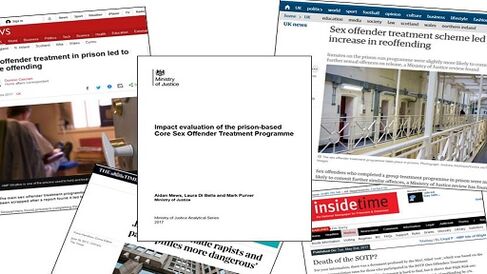Alice Ievins Blog 2

SOTP: The view from the inside
I almost cried when I heard about the SOTP on the TV. I was like, I spent seven years on that. Seven years away from my family. Seven of my kids’ birthdays. I was waiting three years for the SOTP and four years for the Extended and now they tell me it’s made me worse?
In June 2017, the Ministry of Justice published an evaluation of the Core Sex Offender Treatment Programme (SOTP), the main accredited programme provided in English and Welsh prisons for the treatment of men convicted of sex offences. [1] The report – which featured heavily in the Daily Mail and was one of the leading stories on BBC News – found that the programme did not reduce reoffending among sex offenders, and may in fact have increased it. The programme has since been cancelled (as has Extended SOTP, a programme for high- and very high-risk sex offenders who had already completed the SOTP), and two new courses, Horizon and Kaizen, are being offered instead. The findings of the evaluation were complex and controversial, and their validity and implications have been hotly debated in blogs and on Twitter.
But the report has also been discussed in prisons by prisoners. At the moment, we are conducting a lot of fieldwork in a medium-security English prison which only holds men convicted of sex offences. I was in the prison a few days after the report was published, and one of the first people I bumped into was a man I had interviewed a few weeks earlier. He is serving an indeterminate sentence, and had taken SOTP earlier this year as it was on his sentence plan, and he thus thought it was necessary for him to get parole. He was stressed. He worried that, far from helping him to get out, having done the SOTP – a course which had been publicised as potentially making sex offenders worse – might block him from getting parole. He spent the weekend writing to his Probation Officer, his Offender Supervisor and his psychologists – anyone who might be able to give him guidance on what this might mean for his sentence.
A few minutes later, I bumped into another man I know well. He is serving a determinate sentence and will be released in six months, after serving a few years. He was cross. He had just received a letter saying that his application to be transferred into open conditions had been refused as he had not completed everything that was on his sentence plan. I asked what was on his sentence plan, and he said ‘Just the SOTP’.
Not all of the men I’ve spoken to are as cynical about the course as you might expect. One man I know quite well asked me for a private conversation a few weeks ago, to tell me that he had just had his post-programme review and he had been given a good assessment; he was very excited about his visit at the weekend, when he would also tell his sister about his success. I was touched by his pride, and decided against asking him whether the withdrawal of the SOTP had dulled the shine of his achievements. Those who found the course useful for themselves have tended to say that you get out what you put in, that how people react to it is individual; thus the positive transformation they have felt has not always been devalued. As far as possible, programme workers and psychologists have tried to support these men, writing letters to everyone in the prison who took part in the SOTP to offer them meetings, and to say that how people react to it is individual.
Most prisoners have been less sanguine, though. I have not (yet) met anyone whose reaction to the news about the SOTP has totally transformed their perception of the value or legitimacy of SOTP programmes. But those who were cynical about programmes are still cynical, and often more so. In England and Wales, participating in the SOTP was not fully voluntary. The SOTP is often placed on prisoners’ sentence plans, and for those who were on indeterminate sentences, release could be contingent on following their sentence plans and thus completing the course, and I have met dozens of prisoners who have been held in prison over their tariff date while waiting for courses to be made available. Even prisoners with determinate sentences are encouraged to follow their sentence plans in the hope that this will ameliorate the licence conditions they are subject to on release. This hard incentivisation of treatment means that prisoners often see it just as a hurdle to be jumped over, rather than a worthwhile opportunity for reform or rehabilitation. For some prisoners, being told that the hurdle was more than arbitrary, and may have been damaging, has been painful, and confirmed their worst suspicions about the operation of power in prison: that it is too often restrictive yet arbitrary.
Alice Ievins is a PhD Candidate and Research Assistant in the COMPEN team, Institute of Criminology, University of Cambridge.
